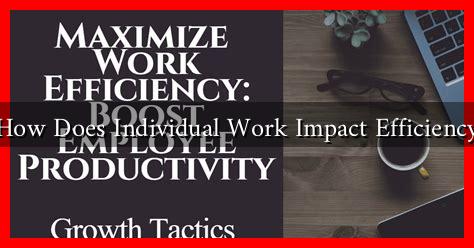-
Table of Contents
How Does Individual Work Impact Efficiency?
In today’s fast-paced work environment, understanding how individual work impacts overall efficiency is crucial for organizations aiming to maximize productivity. Individual contributions can significantly influence team dynamics, project outcomes, and ultimately, the success of a business. This article explores the various factors that affect individual work efficiency and how they can be optimized for better results.
The Role of Individual Skills and Competencies
One of the most significant factors affecting individual work efficiency is the skill set and competencies of the employee. Employees with specialized skills can perform tasks more quickly and accurately than those who are less experienced. This leads to higher overall productivity within teams and organizations.
- Specialization: Employees who specialize in a particular area can complete tasks more efficiently. For example, a software developer with expertise in a specific programming language can write code faster than a generalist.
- Continuous Learning: Organizations that encourage ongoing training and development see improved efficiency. A study by the Association for Talent Development found that companies with comprehensive training programs have 218% higher income per employee than those without.
Work Environment and Its Impact on Efficiency
The physical and psychological work environment plays a crucial role in determining how efficiently individuals can perform their tasks. Factors such as workspace design, noise levels, and access to resources can either enhance or hinder productivity.
- Open vs. Closed Spaces: Open office layouts can foster collaboration but may also lead to distractions. A study by Harvard Business Review found that employees in open offices reported a 32% increase in distractions.
- Access to Resources: Employees who have easy access to the tools and resources they need are more likely to work efficiently. For instance, providing ergonomic furniture can reduce fatigue and increase focus.
Motivation and Individual Work Efficiency
Motivation is a key driver of individual work efficiency. Employees who are motivated tend to be more engaged, which directly correlates with their productivity levels. Various factors can influence motivation, including recognition, rewards, and job satisfaction.
- Recognition Programs: Organizations that implement recognition programs see a 14% increase in employee productivity, according to a study by Gallup.
- Work-Life Balance: Employees who maintain a healthy work-life balance are generally more productive. A survey by Buffer found that 22% of remote workers cited work-life balance as the most significant benefit of their job.
Case Studies: Real-World Examples
Several organizations have successfully improved individual work efficiency through targeted strategies:
- Google: Google is known for its innovative work environment, which includes flexible work hours and a focus on employee well-being. This approach has led to higher employee satisfaction and productivity.
- Salesforce: Salesforce has implemented a comprehensive training program that emphasizes continuous learning. As a result, the company has seen a significant increase in employee performance and overall efficiency.
Measuring Individual Work Efficiency
To understand how individual work impacts efficiency, organizations must implement effective measurement tools. Key performance indicators (KPIs) can help track individual contributions and identify areas for improvement.
- Output Metrics: Measuring the quantity and quality of work produced can provide insights into individual efficiency.
- Time Tracking: Tools like Toggl or Clockify can help employees understand how they spend their time, allowing them to identify inefficiencies.
Conclusion
In conclusion, individual work significantly impacts overall efficiency in organizations. By focusing on skill development, optimizing the work environment, enhancing motivation, and implementing effective measurement tools, businesses can improve productivity and achieve better outcomes. As the workplace continues to evolve, understanding these dynamics will be essential for fostering a culture of efficiency and success.
For further reading on improving workplace efficiency, consider exploring resources from the Forbes Human Resources Council.

